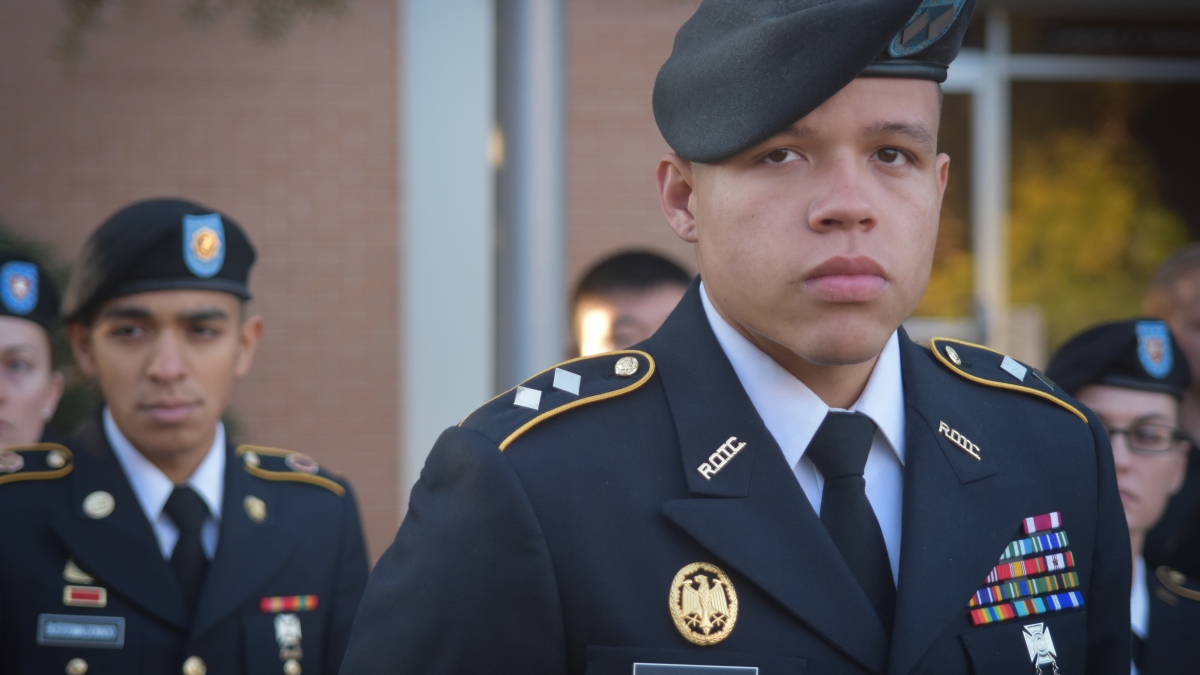From the Army to politics and back again

Army ROTC Cadet Gerald Prater. Photo by Lisa Robbins/Department of Military Science Army ROTC
Editor's note: This is part of a series of profiles for spring 2016 commencement. See the rest here.
For political science major and Army ROTC Cadet Gerald Prater, attending college was not in his plans.
After graduating high school, he enlisted in the U.S. Army in 2010 and served as an intelligence analyst. While deployed to Afghanistan, Prater was given a challenge of 48 hours to determine a potential college to attend and degree program, which changed his future.
After he was accepted into the Green to Gold Active Duty Option Program, a two-year program that provides eligible active-duty enlisted soldiers the opportunity to complete a baccalaureate degree or a two-year graduate degree and commission as an Army officer, he was focused on excelling academically.
However, pursuing an undergraduate degree was only one challenge faced by Prater. As a father raising two children, attending school full-time and serving as a cadet for Army ROTC, his priority was to find a balance when managing his time.
The transition into the college environment was tough at first, but he utilized the Army discipline to create a framework of how to tackle academics, which allowed him to achieve a 4.0 GPA and earn a spot on the Army ROTC Cadet Command Staff as the cadet battalion commander.
This May, Prater will receive his bachelor’s degree in political science and commission as an infantry officer for the U.S. Army.
He answered some questions about his experience.
Question: What was your “aha” moment, when you realized you wanted to study the field you majored in?
Answer: My “aha” moment came long before I even stepped foot on campus. When I was deployed to Afghanistan, I worked under Gen. Mark A. Milley, currently the chief of staff for the U.S. Army. He asked when I was briefing him once what I wanted to do with my life, and I actually had never really thought about anything beyond two or three years down the road. I responded by saying, “I was considering going to college.” He basically gave me 48 hours to come up with a school that I wanted to attend. After narrowing it down to Arizona, I stumbled upon the political science degree and never looked back.
Q: What’s something you learned while at ASU — in the classroom or otherwise — that surprised you, that changed your perspective?
A: I go back to my first political science class called Global Politics (POS 160) with Dr. Charles Ripley — this class served as an introduction and sparked my fascination for international relations. It was one of the first classes I took at ASU and set the tone for the rest of my undergraduate career.
Q: Why did you choose ASU?
A: I chose Arizona State University because of their highly ranked political science degree program.
Q: What’s the best piece of advice you’d give to those still in school?
A: The syllabus is the cheat sheet to success in academic courses. Instructors will give you an outline from beginning to end of assignments, quizzes and readings, which you can use to guide you through courses. The very first thing I did at the beginning of the semester was print each syllabus out and put them in binders, then highlight or cross out as a week would elapse and update my agenda accordingly. That’s how I managed my courses, so I never had any surprises come up.
Q: What was your favorite spot on campus, whether for studying, meeting friends or just thinking about life?
A: My favorite spot on campus would have to be the Army ROTC Cadet Lounge. I’ve been there almost every day since I started school. Not only because I can relate to other people who are in the program with me, but it’s also a good social setting. It was the place where I went to relax, study or just play games and hang out with other cadets.
Q: What are your plans for after graduation?
A: I’m assigned as an infantry officer in the Army, and I am going to serve in that capacity for four years. After that, I will transition into military intelligence. My goal is to serve honorably for my nation for 20 years, then return to my home state of Texas. I plan to get involved in whatever political capacity I can, whether it’d be in a Congressional seat or Senate.
Q: If someone gave you $40 million to solve one problem on our planet, what would you tackle?
A: I would use the $40 million to bolster the education system — the public education system — to continue to find different ways to improve them. I’m firm believer of investing in our youth. I understand the future of this world is in the hands of those who reside in it, so I take a lot of responsibility and accountability for developing not only my own children, but future generations as well.
Written by Stephanie Romero
More Law, journalism and politics

Annual John P. Frank Memorial Lecture enters its 26th year
Dahlia Lithwick, an MSNBC analyst and senior legal correspondent at Slate, is the featured speaker at the School of…

The politics behind picking a romantic partner
A new study reveals the role that politics play when picking out a romantic partner — particularly for older adults.“Findings…

Tips to make tax season less taxing
When it comes to highly unpleasant experiences, filing taxes is probably up there with root canals — which is why people put off…

